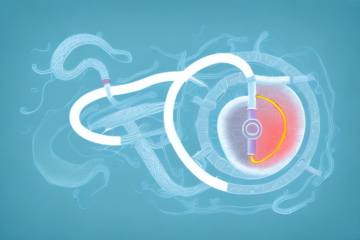Follicle-stimulating hormone (FSH) is a crucial hormone for both males and females. It plays an essential role in maintaining reproductive health and overall hormonal balance. In this comprehensive article, we will dive deep into the function of FSH, its effects on the human body, and the conditions associated with high or low levels of this hormone. So, let’s get started!
What is Follicle-Stimulating Hormone?
FSH is a hormone secreted by the anterior pituitary gland in the brain. It is responsible for controlling the growth and development of ovarian follicles in females and the production of sperm in males. FSH levels rise during the onset of puberty and peak during ovulation and sperm production.
Research has shown that FSH levels can also be used to diagnose certain medical conditions. For example, abnormally high levels of FSH in women can indicate ovarian failure or menopause, while low levels of FSH in men can indicate infertility or testicular failure. Additionally, FSH levels can be monitored in fertility treatments to help regulate ovulation and increase the chances of pregnancy.
The Role of Follicle-Stimulating Hormone in Human Physiology
FSH plays a crucial role in regulating the menstrual cycle in women. It stimulates the growth of ovarian follicles and induces the production of estrogen. In men, FSH stimulates the production of sperm cells in the testicles. Additionally, FSH also plays a part in maintaining bone density, controlling cholesterol levels, and regulating body composition.
Recent studies have also shown that FSH may have a role in the development of certain cancers, such as breast and ovarian cancer. High levels of FSH have been linked to an increased risk of these cancers, while low levels may be protective. Further research is needed to fully understand the relationship between FSH and cancer, but these findings suggest that FSH may have a broader impact on human health beyond its well-known reproductive functions.
Understanding the Hypothalamic-Pituitary-Gonadal Axis
The hypothalamic-pituitary-gonadal axis (HPG) is a complex biological system that is responsible for regulating sex hormones in the human body. The hypothalamus, located in the brain, secretes gonadotropin-releasing hormone (GnRH), which stimulates the pituitary gland to release FSH and luteinizing hormone (LH). In response to FSH and LH, the ovaries release estrogen and the testicles release testosterone. This complex system is crucial for maintaining hormonal balance in the body.
Disruptions in the HPG axis can lead to a variety of health issues, including infertility, menstrual irregularities, and sexual dysfunction. For example, polycystic ovary syndrome (PCOS) is a common condition that affects the HPG axis in women, leading to hormonal imbalances and irregular periods. Similarly, hypogonadism is a condition that affects the HPG axis in men, leading to low levels of testosterone and a range of symptoms, including decreased libido and muscle mass.
Understanding the HPG axis is also important in the development of hormonal therapies for conditions such as menopause and transgender hormone therapy. By manipulating the HPG axis, doctors can help alleviate symptoms and improve quality of life for individuals experiencing hormonal imbalances. However, it is important to carefully monitor hormone levels and potential side effects when using these therapies.
What Happens When Your FSH Levels are Too High or Too Low?
High FSH levels in women may indicate a problem with ovarian function. It can lead to irregular periods, infertility, and early menopause. In men, high FSH levels may indicate testicular failure or damage. On the other hand, low FSH levels can cause delayed puberty in both males and females. It can also lead to low sperm count, menstrual irregularities, and decreased estrogen levels in women.
It is important to note that FSH levels can also be affected by certain medications, such as hormonal contraceptives and fertility treatments. In some cases, FSH levels may fluctuate naturally throughout a woman’s menstrual cycle, with higher levels during the follicular phase and lower levels during the luteal phase.
If you are experiencing symptoms related to FSH levels, such as irregular periods or difficulty conceiving, it is important to speak with your healthcare provider. They may recommend further testing or treatment options, such as hormone therapy or assisted reproductive technologies.
The Link Between FSH and Infertility in Women and Men
FSH plays a crucial role in fertility. High FSH levels in women may indicate a decline in ovarian function and decreased chances of conception. In men, low FSH levels can lead to low sperm count and infertility. FSH tests are an essential tool in diagnosing infertility in both men and women.
It is important to note that FSH levels can also be affected by certain medications and medical conditions. For example, women undergoing fertility treatments may be given medications that increase FSH levels to stimulate ovulation. Additionally, conditions such as polycystic ovary syndrome (PCOS) can cause elevated FSH levels in women.
While FSH tests are useful in diagnosing infertility, they are not the only factor to consider. Other tests, such as semen analysis for men and tests for ovulation and hormone levels in women, may also be necessary to determine the root cause of infertility and develop an effective treatment plan.
How is FSH Measured?
The level of FSH in the blood can be measured using a simple blood test. The best time to measure FSH levels is on the third day of the menstrual cycle in women or in the morning in men. FSH levels vary throughout the menstrual cycle, so timing is crucial for an accurate reading.
Abnormal FSH levels can indicate a variety of conditions, including infertility, menopause, and pituitary gland disorders. In women, high FSH levels may indicate a decline in ovarian function, while low levels may indicate polycystic ovary syndrome (PCOS). In men, high FSH levels may indicate testicular failure, while low levels may indicate hypogonadism. It is important to consult with a healthcare provider to interpret FSH test results and determine appropriate treatment options.
Treatments for FSH-Related Health Conditions
Treatment for FSH-related health conditions varies depending on the underlying cause. In women, hormone replacement therapy (HRT) may be used to regulate FSH levels and alleviate symptoms associated with menopause. In cases of infertility, assisted reproductive technologies (ART), such as in vitro fertilization (IVF), can help couples conceive. In men, testosterone replacement therapy may be used to increase sperm production and regulate FSH levels.
It is important to note that lifestyle changes can also play a role in managing FSH-related health conditions. For example, maintaining a healthy weight, exercising regularly, and reducing stress levels can all help regulate hormone levels and improve overall health. Additionally, certain dietary changes, such as increasing intake of foods rich in antioxidants and omega-3 fatty acids, may also be beneficial.
Natural Ways to Regulate FSH Levels
While medical intervention may be necessary in some cases, there are several natural ways to regulate FSH levels. A healthy diet rich in fruits, vegetables, and lean protein can help maintain hormonal balance. Regular exercise, stress management, and getting enough sleep can also have a positive impact on FSH levels.
In addition to these lifestyle changes, certain herbs and supplements have been shown to help regulate FSH levels. For example, maca root has been found to improve hormonal balance and reduce FSH levels in women with polycystic ovary syndrome (PCOS). Dong quai, black cohosh, and red clover are also commonly used to support hormonal health and regulate FSH levels. However, it is important to consult with a healthcare provider before taking any new supplements or herbs.
Lifestyle Changes to Keep Your FSH Levels Healthy
Maintaining a healthy lifestyle is crucial for maintaining healthy FSH levels. Avoiding smoking and excessive alcohol consumption can help regulate hormonal balance. Reducing exposure to environmental toxins and pollutants can also help keep FSH levels healthy.
Overall, follicle-stimulating hormone is an essential hormone for human health. Proper functioning of FSH is crucial for maintaining fertility, hormonal balance, and overall well-being. Understanding the role of FSH, its effects on the body, and the conditions associated with high or low levels is essential for maintaining healthy FSH levels and overall reproductive health.
In addition to lifestyle changes, certain foods and supplements can also help regulate FSH levels. Foods rich in antioxidants, such as berries, leafy greens, and nuts, can help reduce oxidative stress and inflammation, which can disrupt hormonal balance. Supplements such as vitamin D and omega-3 fatty acids have also been shown to improve FSH levels in some studies.
It’s important to note that FSH levels can also be affected by certain medical conditions and medications. Conditions such as polycystic ovary syndrome (PCOS) and thyroid disorders can cause FSH levels to be too high or too low. Certain medications, such as hormonal contraceptives and chemotherapy drugs, can also affect FSH levels. It’s important to discuss any concerns about FSH levels with a healthcare provider.










